
THE STONE THAT ROLLED
Over ninety percent of human communication is non-verbal. Sharing the risen Christ is a similar story
When I was young and trying to figure out whether Christianity was true or not I spent a lot of time thinking through the resurrection. I grasped the argument of St. Paul in 1 Corinthians that the whole edifice stood or collapsed on whether the resurrection happened or not and so I devoted my attention to it, turning my brain into an informal court of law.
It was said that Jesus didn’t die on the cross and that the resurrection was faked like an ancient David Blaine stunt. I looked at the Gospel account which describes separate streams of blood and water spurting from the body of Jesus, a medical symptom of death which ancient historians would not have understood. And anyway I figured the idea of Jesus surviving the torture and mutilation of his body many times more absurd that the image of John Wayne staggering on with twenty Indian arrows sticking out of him.
It was said the disciples were deluded by the survival fantasy we all experience when someone close dies. Bereaved people often think they have seen the deceased only to realise they were watching someone who just looked like them. Yet when Mary and the travellers to Emmaus met Jesus they thought he was someone else for a time, the opposite of what usually happens in the bereavement fantasy.
It was said the disciples saw an apparition and not a man. Yet perhaps to prove he was not a ghost Jesus ate a piece of fish and cooked breakfast for his friends on the shore of Galilee.
It was said his followers were seduced by some kind of mass psychosis into thinking they had seen him. But there were so many resurrection appearances: some soon after, some much later; some to many, some to few, that this modern piece of psychoanalytical revisionism is asked to do too much.
And it was said the different Gospel stories were inconsistent and not able to hold water. Yet eye-witnesses to events like car crashes routinely give different accounts of the same event. They perceive the event differently but all agree on the central fact of a crash.
I soon realised as I pondered these questions that the debate would just go back and forth in my mind like a baseline tennis rally. I needed to take a position because Christianity is a matter of faith not certainty and what the Bible gives us is a credible structure on which to base belief.
These internal debates were seminal for me. I was a late baby-boomer who was taught to think in rational ways about life. This was how I had to make sense of the faith. Personal experiences of the living God lay ahead of me and so I could not call on many of them to make my choice.
There are strong grounds for saying that only two decades later the way people approach the veracity of the faith has altered profoundly. In a post-modern setting people are less impressed by forensic evidence and even if cornered may simply choose to look at it a different way. Mood and experience are more important than fact and logic; the immediate is prized more than history; personal testimony over propositional truth. Some are irritated by these changes in emphasis. It frustrates them that the evidence for the resurrection can be dismissed with the airy wave of a hand as if its truth or not is a trivial matter of personal conviction without wider relevance.
I share that sense of baby-boomer bewilderment but am also persuaded that today people cherish authenticity and subjective stories in ways that are just as fertile for evangelism. If Jesus is alive we should be able to see him in the lives and the stories of those who claim he is. The irony is that while I pondered the resurrection as a late teenager, the evidence for it was shining out of the faces of friends but I was too preoccupied with logic to notice it. Sociologists have shown how more than ninety percent of human communication is non-verbal – what we do rather than what we say. We are sharing our faith all the time, whether we claim to like doing this or not.
The stone cannot be rolled back into place. Thank God.
POPULAR ARTICLES

Obama's Covert Wars
The use of drones is going to change warfare out of all recognition in the next decades.

Through A Glass Starkly
Images of traumatic incidents caught on mobile phone can be put to remarkable effect.

What Are British Values?
Is there a British identity and if so, what has shaped the values and institutions that form it?


